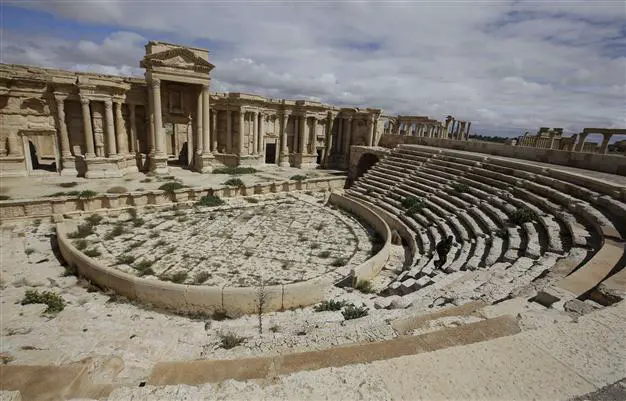Antiquities experts will head soon to the reclaimed ancient caravan city of Palmyra for precise damage assessment done by the Islamic State (IS) group, a Syrian antiquities official told Xinhua on Wednesday.
"The general landscape is relieving. Many monuments are still intact, but we cannot give a precise percentage of the destruction before we can have access to the entire city for assessment," Ahmad Deeb, Director of Museums Affairs, said.
Deeb noted that the proper assessment couldn't be immediately done in Palmyra, which was recaptured by the Syrian army earlier this week, due to the number of booby-traps the IS group had planted before withdrawing from the city.
"We have formed teams of experts to head to Palmyra once we have got the permission to enter the city after all of the booby-traps are dismantled," he said.
Deeb noted that the antiquities department in Syria had anticipated the IS infiltration of the city last May, removing the most valuable and moveable pieces out of the city into safe places.
"Before the terrorists of Daesh (IS in Arabic) entered the city, the antiquities department had moved large quantities of the important antiquities out of Palmyra into safe places. Hundreds of pieces that had been moved out from Palmyra will be returned into that ancient city when the situation gets completely safe," he added.
Deeb said that the destruction that has befallen Palmyra is the same as reported during the IS control of the city.
On May 23, 2015, the militants IS militants partially destroyed the Lion of al-Lat and other statues. The militant group destroyed the Temple of Baalshamin on August 23, 2015.
It became known on September 4, 2015 that IS had destroyed three of the best preserved tower tombs including the Tower of Elahbel.
On October 5, 2015, news media reported IS destroyed the Arch of Triumph.
Deeb, who was recently on a quick trip to Palmyra after the army recaptured it on March 27, said he couldn't reach the old cemetery area, due to the roadside bombs and explosive devices planted by the IS group.
Syria's state-run media said the Russians, who have supported the Syrian army in their push to recapture Palmyra, had sent two groups of bomb experts to help the Syrians in dismantling the booby-traps.
In a recent interview, Maamoun Abdul-Karim, the head of the antiquities department in Damascus, told Xinhua that the Syrian army's recapture of Palmyra ends the destruction of the ancient caravan city and saves a civilization threatened by the barbaric acts of the IS group.
"One of the most beautiful icons in the Syrian heritage is returning to Syria," Abdul-Karim told Xinhua.
Abdul-Karim noted that he is in direct contact with the UNESCO and other concerned international organizations for the restoration process in Palmyra.
"We will immediately start the restoration process and will assess the damages directly from the site," he added.
Meanwhile, President Bashar al-Assad urged the international organizations to help with the restoration process of the destroyed monuments and temples in Palmyra.
In a letter to the UN Secretary-General Ban Ki-moon Wednesday, Assad hailed the UN chief's remarks, in which he welcomed the Syrian army's recapture of the ancient city of Palmyra.
The president, meanwhile, reaffirmed his government's readiness to cooperate with all "honest efforts" to counter terrorism, saying that "this moment could be the most appropriate to accelerate the collective war on terror."
He said the success on the battlefield, with Russia's support, is going to speed up a political settlement in Syria, not hinder it.
Last May, Palmyra fell to the IS, which destroyed the city's military prison along with several Islamic tombs. It also publicly executed soldiers and individuals accused of working for the government.
Over three weeks ago, the Syrian army backed by Russia and Shiite fighters of the Lebanese Hezbollah group started a wide-scale operation for the recapture of the city, succeeding to retake it recently.
Palmyra contains monumental ruins of a great city that was once one of the world's most important cultural centers.
Before the onset of the Syria crisis five years ago, Syria, endowed with prehistoric Greek, Byzantine and Islamic heritage, used to attract numerous multinational archaeological missions seeking new clues and investigating historical facts concerning the development of civilizations. Enditem
 简体中文
简体中文

